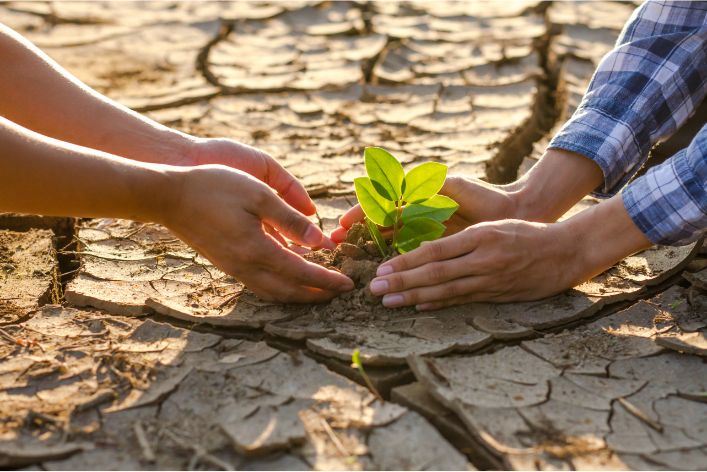Last Updated on May 16, 2023
Climate change is a global phenomenon that is impacting human health. Rising temperatures, increased air pollution, extreme weather events, and changes in precipitation patterns are some of the consequences.
Climate-related health impacts include increased incidents of respiratory and cardiovascular diseases, malnutrition, mental health disorders, and injuries from extreme weather events. The effects of climate change are not limited to physical health but can also impact mental and emotional well-being.

Adapting to the effects of climate change is essential for better health outcomes. Awareness, education, and equitable access to health services are crucial components of climate change adaptation. Promoting sustainable development practices, reducing greenhouse gas emissions, and investing in green infrastructure are important measures that can mitigate the impact of climate change on human health.
Climate change is a global issue that has far-reaching impacts on human health. By understanding the risks and taking appropriate measures to adapt, we can ensure better health outcomes for individuals and communities.
As the world continues to grapple with the effects of climate change, it is important for policymakers, health professionals, and the general public to work together and take a proactive approach to mitigate the impact on human health.
Understanding Climate Change
Climate change has become a significant global concern as it has a significant impact on human health and the environment. Simply put, climate change refers to a long-term change in the Earth’s weather patterns primarily caused by human activities like industrialization and deforestation.
Definition of Climate Change
Climate change is an enduring change in the distribution of weather patterns that lasts for more than a few decades. It is mainly caused by an increase in the Earth’s surface temperature caused by human activities. Scientists use various indicators to measure climate change, including ocean temperatures, sea levels, and atmospheric carbon levels.
Causes and Effects of Climate Change on Human Health
Climate change has a significant impact on human health by enhancing the spread of deadly diseases and worsening respiratory disorders. Rising temperatures lead to increased air pollution which can cause permanent lung damage. Long periods of drought and heat waves are also detrimental to human health as they increase the risk of dehydration and heat exhaustion that could be fatal.
Moreover, climate change leads to a decline in water quality and creates breeding grounds for disease-carrying insects, increasing the incidence of malaria, dengue fever, and other deadly illnesses.
The Role of Greenhouse Gas Emissions in Climate Change
Greenhouse gases, especially carbon dioxide, are one of the principal drivers of climate change. They result from human activities like transportation, deforestation, industrial processes, and fossil fuel burning. When these gases are released into the atmosphere, they prevent heat from escaping into space, causing the planet’s temperature to rise.
Carbon dioxide (CO2) is one of the leading greenhouse gases because of its abundance and long-term persistence in the atmosphere. Methane (CH4) is another potent greenhouse gas produced by human activities like agriculture and livestock breeding, and fossil fuels. Overall, these gases account for the changes in the Earth’s atmosphere, leading to significant climate change repercussions.
Understanding climate change is critical for developing strategies for mitigating its effects, as it has a far-reaching impact on the environment and human health. Climate change causes long-term changes in weather patterns and is primarily caused by human activities that emit greenhouse gases.
To save the planet, it is essential that we all understand the consequences of climate change and take steps to reduce greenhouse gas emissions. We all have a role to play, from individuals cutting down on emissions to countries increasing the use of renewable energy. Together, we can create a greener and more sustainable future for generations to come.
Read: Impact of Climate Change on Coastal Properties and Insurance Costs
Adapting to Climate Change for Better Health
Climate change poses a significant threat to global health, and its impacts will only continue to increase unless effective adaptation measures are implemented. Adapting to climate change is crucial in reducing the negative consequences of the changing climate, especially with regard to improving human health. In this article, we will discuss the importance of adapting to climate change, factors to consider, and examples of effective adaptation strategies for better health.
Importance of Adapting to Climate Change
Adaptation measures are essential in reducing the negative health impacts of climate change. Climate change is associated with increased incidences of heatwaves, droughts, floods, storms and other extreme events. These events can cause direct or indirect health impacts, including heat stress, dehydration, cardiovascular and respiratory diseases, waterborne and foodborne diseases, and mental health problems. Hence, the importance of adapting to climate change cannot be overstressed.
Factors to Consider when Adapting to Climate Change for Better Health
Adapting to climate change is a complex process that requires the consideration of various factors. Some of the critical factors that must be considered include:
- Vulnerability: Understanding which groups are most vulnerable to the impacts of climate change and addressing their specific needs.
- Risk assessment: Assessing the current and future climate risks to human health and well-being to inform effective adaptation strategies.
- Inter-sectoral collaboration: Collaboration among various sectors, including health, agriculture, water, energy, and environment, is necessary to develop holistic and effective adaptation strategies.
- Community participation: Ensuring that communities are actively engaged in developing and implementing climate change adaptation policies and strategies.
- Monitoring and evaluation: Regular monitoring and evaluation of adaptation measures to measure effectiveness and improve future interventions.
Examples of Effective Adaptation Strategies for Better Health
There are several effective adaptation strategies that can improve human health in the face of climate change. Some of these strategies include:
- Heatwave early warning systems: Implementing early warning systems for heatwaves to prevent heat stress and other heat-related illnesses.
- Flood management: Implementing effective flood management strategies to prevent waterborne diseases and ensure adequate water supply for drinking and hygiene purposes.
- Food security: Ensuring food security through sustainable agriculture and improved food storage to prevent foodborne diseases and malnutrition in the event of climate-related disasters.
- Vector control: Implementing effective vector control strategies to prevent the spread of vector-borne diseases like malaria, dengue fever, and Zika virus.
- Green infrastructure: Developing green infrastructure, such as urban parks and gardens, to improve air quality and mental health in urban areas.
Adapting to climate change is essential in reducing the negative health impacts associated with climate change. Understanding the factors to consider when adapting to climate change and employing effective adaptation strategies, such as early warning systems, flood management, food security, vector control, and green infrastructure, will go a long way in improving human health in the changing climate.
Read: How Can We Improve Air Quality for Better Health?
Strategies for Adapting to Climate Change
Climate change is a serious environmental issue that affects the planet on a global scale. As temperatures rise and weather patterns become more erratic, it is crucial that we take action to adapt and mitigate the negative impacts. Here are some strategies for adapting to climate change:
Building resilience to extreme weather events
- Developing early warning systems for extreme weather
- Upgrading infrastructure to withstand extreme weather
- Creating emergency plans for extreme weather events
Promoting sustainable food systems
- Supporting local food producers
- Reducing food waste
- Promoting plant-based diets
Using green transportation options
- Promoting public transportation
- Encouraging cycling and walking
- Investing in electric vehicles
Reducing energy consumption
- Implementing energy-efficient practices in homes and businesses
- Investing in renewable energy sources
- Switching to LED lighting
Supporting green spaces and urban forestry
- Planting trees and vegetation in urban areas
- Investing in green infrastructure
- Creating biodiverse habitats for wildlife
By implementing these strategies, communities can reduce their vulnerability to climate change and help mitigate the negative impacts. Building resilience to extreme weather events, promoting sustainable food systems, using green transportation options, reducing energy consumption, and supporting green spaces and urban forestry are some of the most effective ways to adapt to climate change.
Read: Impact Investing: Investing in Companies and Causes That Align with Your Values

Taking Action to Adapt to Climate Change for Better Health
Climate change is a grave reality that is affecting our health, and there is an urgent need to take action to adapt. The following are some individual actions we can take to mitigate the effects of climate change on our health:
- Reduce the use of fossil fuels by driving less and using public transportation, walking or biking more.
- Save energy by turning off lights and unplugging electronic devices when not in use.
- Eat a healthy, plant-based diet that has minimal impact on the environment.
- Reduce the use of plastic bags and other disposable items.
- Properly dispose of hazardous waste and chemicals.
However, individuals can only make a small difference, and the government has a crucial role to play in promoting climate adaptation for better health.
Government policies are essential in addressing climate change and associated health impacts.
Governments can promote adaptation by taking actions such as:
- Developing and implementing greenhouse gas reduction policies.
- Creating land use policies that consider the impact on climate change.
- Ensuring that public facilities and infrastructure are designed with climate impacts in mind.
- Establishing regulations on industries with high carbon emissions.
However, government policies alone are not enough to address climate change, and community engagement is critical.
Communities can engage in climate adaptation by:
- Educating themselves about the potential impacts of climate change on their health.
- Participating in local government meetings and advocating for policies that address climate change.
- Developing community emergency response plans and strategies.
- Supporting local agriculture and food production to reduce the environmental impact of food transport.
- Promoting local transportation options such as walking and biking.
Climate change and its impact on health is an urgent issue that requires immediate action. Everyone has a role to play in mitigating climate change, from individuals to governments to communities. By taking small, individual actions, promoting government policies, and engaging in community efforts, we can make a significant difference in our health and the health of the planet.
Read: The Growing Market for Green Hotel Investments
Conclusion
Adapting to climate change is crucial for better health outcomes. Climate change poses significant threats to not only the environment but also human health. The incidence of certain diseases and health conditions is on the rise as a result of climate change, making it important to adapt to these changes.
It is imperative for individuals, communities, and governments to take action to mitigate the effects of climate change. Simple actions like using public transport, growing your food, reducing energy consumption can help. Communities can come together to create green spaces and reduce carbon emissions. Governments can regulate industries that release unnecessary pollutants into the air.
Adaptation to climate change is a shared responsibility, and every individual has a part to play. We owe it to ourselves and future generations to take steps now and ensure that we create a better and sustainable world. Let us all take action, no matter how small, towards building a cleaner, safer, and healthier planet.
Read: Sustainable Development in Africa: Strategies and Innovations For Building a Better Future
Before You Go…
Hey, thank you for reading this blog to the end. I hope it was helpful. Let me tell you a little bit about Nicholas Idoko Technologies. We help businesses and companies build an online presence by developing web, mobile, desktop, and blockchain applications.
We also help aspiring software developers and programmers learn the skills they need to have a successful career. Take your first step to becoming a programming boss by joining our Learn To Code academy today!
Be sure to contact us if you need more information or have any questions! We are readily available.











